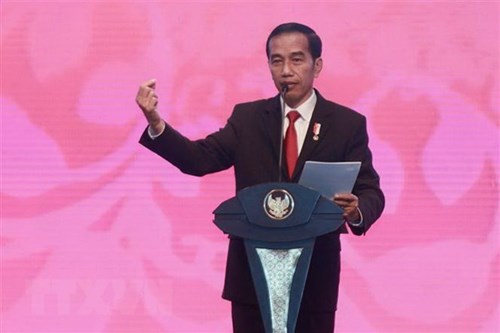Indonesian Foreign Ministry spokesperson Arrmanatha Nasir said viewing such areas of potential, the President is keen to ensure that the two countries have the opportunity to cooperate further.
    |
 |
|
Indonesian President Joko Widodo |
According to Indonesia’s Antara News, Indonesia and Vietnam are among countries with a large population, ranking first and third in the Association of Southeast Asian Nations (ASEAN). Both countries have also shown high economic growth in the last three years.
In terms of trade and investment, the governments of both countries will put in efforts to reduce trade barriers.
The leaders of both nations have agreed to accelerate the implementation of an action plan to improve Vietnam-Indonesia Strategic Partnership during the 2014-2018 period and also forge economic, trade, and investment relations.
During his stay in Hanoi, President Jokowi is scheduled to meet his Vietnamese counterpart Tran Dai Quang to discuss a number of issues, including cooperation in maritime and fisheries as well as the completion of the Exclusive Economic Zone boundaries in the East Sea (South China Sea).
Arrmanatha said maritime border negotiations are indeed a lengthy process, raising hope for a political push from the two leaders to accelerate the process.
The governments of both nations will also sign two memoranda of understanding on health and tourism, as well as issue a joint communiqué on illegal, unreported and unregulated fishing.
In addition to the bilateral meeting, President Jokowi is scheduled to speak at the World Economic Forum on ASEAN themed "ASEAN Priorities in the Fourth Industrial Revolution", which is relevant to considering the world is currently entering Industry 4.0 and present challenges.
The message that the President will deliver at the forum is the importance of ASEAN to have a strategy in place to handle the impacts of the fourth Industrial Revolution, according to Arrmanatha.
Moreover, it is important to develop cooperation among stakeholders to engage startups and small and medium enterprises (SMEs) in building inclusive value chains and innovative economy since the Industrial Revolution 4.0 is not only related to large industries.
Source: VNA